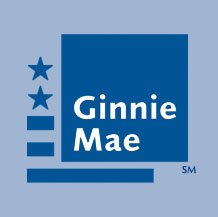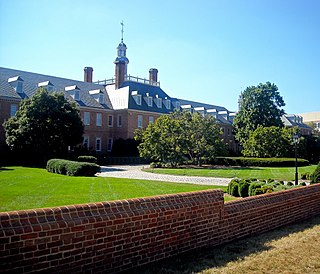
The Farm Credit Administration is an independent agency of the Executive Branch of the federal government of the United States. It regulates and examines the banks, associations, and related entities of the Farm Credit System, a network of borrower-owned financial institutions that provide credit to farmers, ranchers, and agricultural and rural utility cooperatives. It derives its authority from the Farm Credit Act of 1971. The FCA is headquartered in McLean, Virginia, near Washington, DC.

The Government National Mortgage Association (GNMA), or Ginnie Mae, was established in the United States in 1968 to promote home ownership. As a wholly owned government corporation within the Department of Housing and Urban Development (HUD), Ginnie Mae’s mission is to expand affordable housing finance in America by linking domestic and global capitalization to the nation's housing finance markets, providing market liquidity to federally sponsored mortgage lending programs.

The Federal National Mortgage Association (FNMA), commonly known as Fannie Mae, is a United States government-sponsored enterprise (GSE) and, since 1968, a publicly traded company. Founded in 1938 during the Great Depression as part of the New Deal, the corporation's purpose is to expand the secondary mortgage market by securitizing mortgage loans in the form of mortgage-backed securities (MBS), allowing lenders to reinvest their assets into more lending and in effect increasing the number of lenders in the mortgage market by reducing the reliance on locally based savings and loan associations. Its brother organization is the Federal Home Loan Mortgage Corporation (FHLMC), better known as Freddie Mac. As of 2018, Fannie Mae is ranked #21 on the Fortune 500 rankings of the largest United States corporations by total revenue.
A savings and loan association (S&L), or thrift institution, is a financial institution that specializes in accepting savings, deposits, and making mortgage and other loans. The terms "S&L" or "thrift" are mainly used in the United States; similar institutions in the United Kingdom, Ireland and some Commonwealth countries include building societies and trustee savings banks. They are often mutually held, meaning that the depositors and borrowers are members with voting rights, and have the ability to direct the financial and managerial goals of the organization like the members of a credit union or the policyholders of a mutual insurance company. While it is possible for an S&L to be a joint-stock company, and even publicly traded; in such instances it is no longer truly a mutual association, and depositors and borrowers no longer have membership rights and managerial control. By law, thrifts can have no more than 20 percent of their lending in commercial loans — their focus on mortgage and consumer loans makes them particularly vulnerable to housing downturns such as the deep one the U.S. experienced in 2007.

The Federal Home Loan Mortgage Corporation (FHLMC), known as Freddie Mac, is a public government-sponsored enterprise (GSE), headquartered in Tysons Corner, Virginia. Freddie Mac is ranked No. 38 on the 2018 Fortune 500 list of the largest United States corporations by total revenue.

The Canada Deposit Insurance Corporation is a Canadian federal Crown Corporation created by Parliament in 1967 to provide deposit insurance to depositors in Canadian commercial banks and savings institutions. CDIC insures Canadians' deposits held at Canadian banks up to C$100,000 in case of a bank failure. CDIC automatically insures many types of savings against the failure of a financial institution. However, the bank must be a CDIC member and not all savings are insured. CDIC is also Canada's resolution authority for banks, federally regulated credit unions, trust and loan companies as well as associations governed by the Cooperative Credit Associations Act that take deposits.
A government-sponsored enterprise (GSE) is a type of financial services corporation created by the United States Congress. Their intended function is to enhance the flow of credit to targeted sectors of the economy and to make those segments of the capital market more efficient and transparent, and to reduce the risk to investors and other suppliers of capital. The desired effect of the GSEs is to enhance the availability and reduce the cost of credit to the targeted borrowing sectors primarily by reducing the risk of capital losses to investors: agriculture, home finance and education. Well known GSEs are the Federal National Mortgage Association, or Fannie Mae, and the Federal Home Loan Mortgage Corporation, or Freddie Mac.
The Great Depression had a pronounced economic and political effect on South Africa, as it did on most nations at the time. As world trade slumped, demand for South African agricultural and mineral exports fell drastically. It is believed that the social discomfort caused by the depression was a contributing factor in the 1933 split between the "gesuiwerde" (purified) and "smelter" (fusionist) factions within the National Party and the National Party's subsequent fusion with the South African Party.
A loan guarantee, in finance, is a promise by one party to assume the debt obligation of a borrower if that borrower defaults. A guarantee can be limited or unlimited, making the guarantor liable for only a portion or all of the debt.
The Farm Credit System (FCS) in the United States is a nationwide network of borrower-owned lending institutions and specialized service organizations. The Farm Credit System provides more than $304 billion in loans, leases, and related services to farmers, ranchers, rural homeowners, aquatic producers, timber harvesters, agribusinesses, and agricultural and rural utility cooperatives.

The Financial Institutions Reform, Recovery, and Enforcement Act of 1989 (FIRREA), is a United States federal law enacted in the wake of the savings and loan crisis of the 1980s.
Mortgage Insurance is an insurance policy which compensates lenders or investors for losses due to the default of a mortgage loan. Mortgage insurance can be either public or private depending upon the insurer. The policy is also known as a mortgage indemnity guarantee (MIG), particularly in the UK.

A mortgage loan or, simply, mortgage is used either by purchasers of real property to raise funds to buy real estate, or alternatively by existing property owners to raise funds for any purpose, while putting a lien on the property being mortgaged. The loan is "secured" on the borrower's property through a process known as mortgage origination. This means that a legal mechanism is put into place which allows the lender to take possession and sell the secured property to pay off the loan in the event the borrower defaults on the loan or otherwise fails to abide by its terms. The word mortgage is derived from a Law French term used in Britain in the Middle Ages meaning "death pledge" and refers to the pledge ending (dying) when either the obligation is fulfilled or the property is taken through foreclosure. A mortgage can also be described as "a borrower giving consideration in the form of a collateral for a benefit (loan)".
Title 12 of the United States Code outlines the role of Banks and Banking in the United States Code.

In United States federal agriculture legislation, the Agricultural Credit Act of 1987 was enacted in response to the severe financial crisis of the early- to mid-1980s, which affected both farmers and their lending institutions.
Lloyds Development Capital (Holdings) Limited (LDC), is a mid-market private equity house and subsidiary of Lloyds Banking Group, established in 1981 as Lloyds Development Capital Limited. From 1999 to 2011, it was known as Lloyds TSB Development Capital Limited.
Glacier Bancorp, Inc, headquartered in Kalispell, Montana, is a Montana corporation incorporated in 2004 as a successor corporation to the Delaware corporation originally incorporated in 1990. The Company is a publicly traded company and its common stock trades on the NASDAQ Global Select Market under the symbol GBCI. The Company provides commercial banking services from locations in Montana, Idaho, Utah, Washington, Wyoming, Colorado, and Arizona through its wholly owned bank subsidiary, Glacier Bank. The Company offers a wide range of banking products and services, including: 1) retail banking; 2) business banking; 3) real estate, commercial, agriculture and consumer loans; and 4) mortgage origination services. The Company serves individuals, small to medium-sized businesses, community organizations and public entities.








